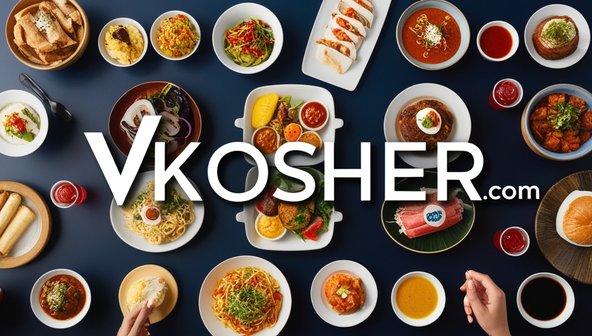Embracing Kosher and Gluten-Free Lifestyles: A Comprehensive Guide
In today's diverse food landscape, the convergence of dietary restrictions and preferences has given rise to a growing demand for products that cater to both kosher and gluten-free requirements. Understanding the principles behind these dietary guidelines and how they intersect can help individuals make informed choices that align with their health, ethical, and religious beliefs. This comprehensive guide delves into the essence of kosher and gluten-free practices, their significance, and how to navigate a lifestyle that respects both.
Understanding Kosher Dietary Laws
Kosher dietary laws, originating from Jewish religious texts, govern the preparation and consumption of food. These laws are rooted in the Torah and are designed to align with Jewish principles of cleanliness, sanctity, and ethical living. The laws are detailed in various texts, including the Talmud, and are interpreted and applied through centuries of rabbinic scholarship.
At the heart of kosher laws is the concept of separation. This includes the separation of dairy and meat products, which must be consumed in distinct meals and prepared using different utensils and cookware. Furthermore, kosher laws mandate the use of ingredients that come from animals that have been slaughtered in a specific, humane manner. The meat must come from animals that chew their cud and have split hooves, such as cows and sheep, while pork and shellfish are strictly forbidden.
Another crucial aspect of kosher dietary practices is the requirement for all processed foods to be certified kosher. This certification ensures that the products comply with all aspects of kosher law, including the sources of ingredients and the methods of preparation. The kosher certification is provided by various organizations, and products are often marked with a symbol indicating their kosher status.
The Gluten-Free Movement
Gluten is a protein found in wheat, barley, and rye. For those with celiac disease, an autoimmune disorder, consuming gluten can cause severe health issues, including digestive problems, nutrient deficiencies, and long-term complications. As awareness of celiac disease and gluten sensitivity has increased, so too has the demand for gluten-free products.
Gluten-free diets exclude any food that contains gluten, focusing instead on grains and starches that do not pose a risk. This includes alternatives such as rice, corn, quinoa, and gluten-free oats. The rise of the gluten-free movement has been driven by both medical necessity and a growing awareness of gluten intolerance. Individuals who do not have celiac disease may still choose a gluten-free diet for various reasons, including perceived health benefits and personal preferences.
The Intersection of Kosher and Gluten-Free
Combining kosher and gluten-free diets presents unique challenges and opportunities. For many individuals adhering to both dietary guidelines, finding products that meet both criteria can be complex. The intersection of these diets requires a comprehensive understanding of both kosher laws and gluten-free standards, ensuring that all aspects of food preparation and consumption are compliant.
Kosher gluten-free products must meet the requirements of both dietary laws. This means that they must be free from gluten-containing grains and also adhere to kosher regulations. For example, a gluten-free product that is also kosher must be prepared in a facility that does not process gluten-containing products to avoid cross-contamination. Additionally, all ingredients must be sourced from kosher-approved suppliers and the product must be certified by a recognized kosher certification authority.
Navigating Kosher Gluten-Free Options
For those navigating a kosher gluten-free diet, it is essential to seek out products and resources that accommodate both needs. Many grocery stores and specialty food shops now offer a variety of kosher gluten-free products, ranging from baked goods to snacks and pantry staples. These products are often labeled with both kosher symbols and gluten-free certifications, making it easier for consumers to make informed choices.
In addition to packaged foods, there are many recipes and cooking techniques that can be employed to create delicious and compliant meals at home. By focusing on naturally gluten-free ingredients and adhering to kosher preparation methods, individuals can enjoy a diverse and satisfying range of dishes. Cooking from scratch allows for greater control over ingredient quality and preparation processes, ensuring that all dietary requirements are met.
The Benefits of a Kosher Gluten-Free Diet
Adhering to a kosher gluten-free diet can offer several benefits, particularly for individuals with specific health needs and religious observances. For those with celiac disease or gluten sensitivity, a gluten-free diet is essential for maintaining health and preventing adverse reactions. When combined with kosher practices, individuals can also ensure that their dietary choices align with their religious values, creating a holistic approach to eating that supports both physical well-being and spiritual adherence.
The kosher gluten-free lifestyle also promotes increased awareness of food sourcing and preparation. This heightened awareness often leads to a greater appreciation for the quality and integrity of ingredients, as well as a deeper understanding of dietary practices. By adhering to both kosher and gluten-free guidelines, individuals can foster a more mindful approach to eating that supports their overall health and ethical beliefs.
Challenges and Solutions in Kosher Gluten-Free Living
Living a kosher gluten-free lifestyle presents its own set of challenges, particularly in finding suitable products and navigating complex dietary restrictions. One major challenge is the risk of cross-contamination, which can occur when gluten-free and non-gluten-free products are processed in the same facility or using the same equipment. To mitigate this risk, it is important to seek out products that are specifically labeled as both kosher and gluten-free, and to be cautious when dining out or purchasing from bulk suppliers.
Another challenge is the limited availability of kosher gluten-free options in certain areas. While many urban centers and specialty stores offer a wide range of these products, individuals in less populated regions may find it more difficult to access them. In such cases, online shopping and mail-order services can provide a viable solution, offering a broader selection of kosher gluten-free products that can be delivered directly to one's doorstep.
Resources and Support for Kosher Gluten-Free Living
For individuals navigating a kosher gluten-free lifestyle, several resources and support systems are available to assist with dietary needs. Online communities, forums, and social media groups provide valuable platforms for sharing information, recipes, and tips for maintaining both kosher and gluten-free diets. These communities often include individuals with personal experience and expertise, offering practical advice and emotional support.
Additionally, there are numerous cookbooks and websites dedicated to kosher gluten-free recipes and meal planning. These resources provide inspiration and guidance for creating meals that meet both dietary requirements, making it easier to enjoy a diverse and satisfying diet. Many of these resources are developed by experts in both kosher and gluten-free cooking, ensuring that the recipes adhere to the highest standards of both dietary practices.
The Future of Kosher Gluten-Free Products
As awareness of dietary needs continues to grow, the market for kosher gluten-free products is expected to expand. Food manufacturers and producers are increasingly recognizing the demand for products that cater to both dietary restrictions, leading to innovations and improvements in the availability and quality of kosher gluten-free options. This trend is likely to result in a wider variety of products and more accessible options for individuals adhering to these dietary guidelines.
The future of kosher gluten-free living also holds promise in terms of advancements in food technology and production methods. As new ingredients and techniques are developed, it will become easier to create products that meet both kosher and gluten-free standards without compromising on taste or quality. These advancements will continue to support individuals in their pursuit of a healthy, ethical, and enjoyable diet.
Conclusion
Embracing a kosher gluten-free lifestyle involves navigating a complex but rewarding intersection of dietary principles. By understanding the foundations of kosher laws and gluten-free practices, individuals can make informed choices that align with their health needs and ethical beliefs. The availability of kosher gluten-free products and resources continues to grow, providing greater support for those adhering to both dietary guidelines. As the market and technological advancements evolve, the future holds promise for even more accessible and diverse options, ensuring that individuals can enjoy a fulfilling and compliant diet.
Navigating this path requires diligence and awareness, but the benefits of combining kosher and gluten-free principles offer a unique opportunity to enhance one's dietary practices while honoring both personal health and spiritual values.




